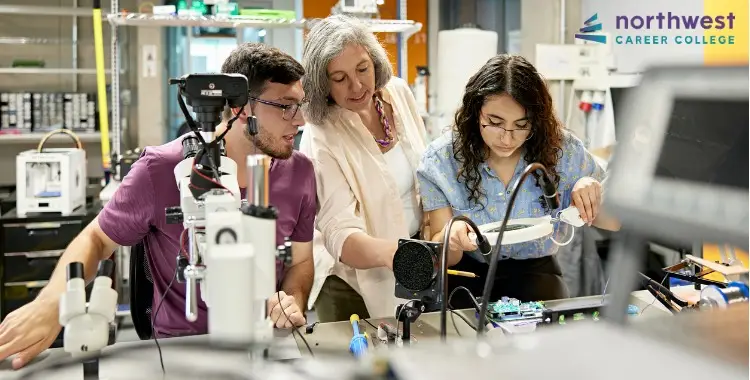The Importance of Trade Schools in Modern Education
- June 24, 2024
- 3.7k views
- 4 min read

Traditional four-year colleges mostly dominate the education system. However, trade schools offer a compelling, practical, and cost-efficient alternative that closely aligns with the industry in the modern world. These schools are important institutions that train students in particular skills, enabling them to secure jobs as electricians, plumbers, health care technicians, and culinary artists. This article will discuss why trade schools are essential to today’s education system, providing vital pathways for students to gain employment and thrive in specialized careers.
Bridging the Skills Gap
Trade schools are essential in bridging the skills gap in the economy. There is a need for more skilled professionals in many sectors, and it offers a direct solution by providing trainees with specific skills relevant to their chosen field.
Vocational schools focus on hands-on training and practical experience to ensure that learners have theoretical knowledge and are equipped to perform on the job from day one. Aligning educational outcomes with industry needs provides a more efficient workforce development model, which traditional colleges often need to improve.
Cost-Effective Education
Trade schools provide a cost-effective option, as they typically have lower tuition fees than traditional colleges. Attending a trade school also reduces the time and investment needed to start a career since most programs can be completed within two years or less. Additionally, trade school students are less likely to accumulate significant debt due to the lower costs and reduced program durations. So, the benefits of attending a trade school include:
- Lower tuition fees compared to traditional colleges
- Shorter program durations, typically two years or less
- Reduced need for student loans due to lower costs and program durations
High Demand for Trade Skills
The demand for skilled tradespeople is increasing due to ongoing infrastructure developments and a large workforce retiring. The fields with the greatest need for tradespeople include construction, plumbing, electrical work, and automotive technology.
Positive job prospects such as competitive wages, long-term job security, and potential advancement to supervisory positions with increasing pay are all attractive elements for those with trade school degrees. A tailored curriculum can help individuals develop the necessary skills and knowledge to succeed in these fields.
Tailored Curriculum and Hands-On Learning
Trade schools offer curriculums specifically designed for hands-on learning. This type of education focuses on meeting specific industries’ needs, ensuring that students acquire relevant and up-to-date skills. In addition to enhancing learning, the hands-on approach also boosts confidence as students apply their knowledge in real-life situations before entering the workforce.
Flexible Learning Options
Trade schools are known for their flexibility and willingness to offer different learning options to students. For instance, they provide evening classes, part-time schedules, and online courses, making education accessible to students who are already working or have other commitments.
Such flexibility is crucial for creating an inclusive education environment where students from diverse backgrounds can pursue their career goals without compromising their current responsibilities or financial stability.
Supporting Economic Growth
Trade schools are crucial in boosting local economies. By training students in high-demand trades, these schools ensure a ready supply of skilled workers well-equipped to support growth and sustainability in various industries. Graduates from these schools typically find employment within their communities, directly boosting the local economy and indirectly promoting community development.
Enhancing Career Opportunities with Certifications
Trade school programs offer numerous benefits, including the potential for earning industry-recognized certifications. These certifications demonstrate that a professional possesses the required skills and knowledge to excel in a particular job, leading to better job prospects, higher wages, and greater recognition within the industry. For example, becoming a Certified Electrician could open up a range of opportunities in both residential and commercial projects.
Conclusion
Trade schools are integral to the contemporary education system, providing practical, affordable, and timely training that matches the workforce’s needs. Most students view them as direct ways to lucrative careers filled with personal development opportunities. Trade schools focus on skill-specific training and hands-on experience, and in so doing, they offer the necessary support to the general economic landscape in dealing with the critical skills shortages in place. If you’re interested in pursuing a career in a trade, don’t hesitate to enroll in our program at Northwest Career College today! Our Trade school program provides comprehensive training and practical experience that equips you with the skills required to excel in your chosen field.



